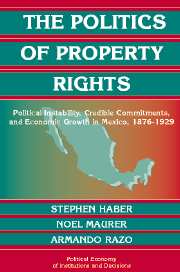 The Politics of Property Rights
The Politics of Property Rights Book contents
- Frontmatter
- Contents
- List of Illustrations and Tables
- List of Abbreviations
- Acknowledgments
- THE POLITICS OF PROPERTY RIGHTS
- 1 Introduction
- 2 Theory: Instability, Credible Commitments, and Growth
- 3 VPI Coalitions in Historical Perspective: Mexico's Turbulent Politics, 1876–1929
- 4 Finance
- 5 Industry
- 6 Petroleum
- 7 Mining
- 8 Agriculture
- 9 Conclusions
- References
- Index
- Titles in the series
2 - Theory: Instability, Credible Commitments, and Growth
Published online by Cambridge University Press: 02 December 2009
- Frontmatter
- Contents
- List of Illustrations and Tables
- List of Abbreviations
- Acknowledgments
- THE POLITICS OF PROPERTY RIGHTS
- 1 Introduction
- 2 Theory: Instability, Credible Commitments, and Growth
- 3 VPI Coalitions in Historical Perspective: Mexico's Turbulent Politics, 1876–1929
- 4 Finance
- 5 Industry
- 6 Petroleum
- 7 Mining
- 8 Agriculture
- 9 Conclusions
- References
- Index
- Titles in the series
Summary
All governments – stable and unstable – face a commitment problem: if they are strong enough to arbitrate property rights, they are also strong enough to confiscate them. If the population does not believe that the government will refrain from exercising its power, then it will not invest. If there is no investment, there will be little economic activity, and there will be insufficient tax revenues to sustain the government.
The commitment problem is essentially a problem of contract enforcement. In a stable political system, a sovereign government offers property rights protection in exchange for some kind of benefit, typically a stream of tax revenues, from the holders of those property rights. The government and the asset holders assume contractual obligations, much in the same way that any two individuals or corporate bodies can. In a contract between two private parties, of course, the government, typically through the court system, ultimately serves as the third-party enforcer of the contract. A thorny problem arises, however, when the government is itself a party to the contract: the government has a monopoly over the enforcement of property rights but will only enforce those rights when it is in its interest to do so. Even if there is a promise of full enforcement, a sovereign government will be tempted to break it afterward. Private actors can, of course, anticipate government opportunism and therefore choose to invest less or not at all.
- Type
- Chapter
- Information
- The Politics of Property RightsPolitical Instability, Credible Commitments, and Economic Growth in Mexico, 1876–1929, pp. 18 - 40Publisher: Cambridge University PressPrint publication year: 2003


